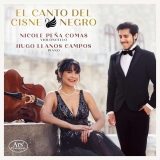 El canto do cisne negro; José Elizondo: Otono en Buenos; Constantino Gaito: Sonate für Cello und Klavier; Joaquin Nin: Seguida Espagnola für Cello und Klavier; Manuel Maria Ponce: Sonate für Cello und Klavier; Luis Saglie: Se juntan dos palomitas aus Canciones para Violeta für Cello und Klavier; Heitor Villa Lobos: O canto do cisne negro; Nicole Pena Comas, Cello, Hugo Llanos Campos, Klavier; 1 CD Ars Produktion 38 579; Aufnahme 02/2020, Veröffentlichung 20/11/2020 (61'56) – Rezension von Uwe Krusch
El canto do cisne negro; José Elizondo: Otono en Buenos; Constantino Gaito: Sonate für Cello und Klavier; Joaquin Nin: Seguida Espagnola für Cello und Klavier; Manuel Maria Ponce: Sonate für Cello und Klavier; Luis Saglie: Se juntan dos palomitas aus Canciones para Violeta für Cello und Klavier; Heitor Villa Lobos: O canto do cisne negro; Nicole Pena Comas, Cello, Hugo Llanos Campos, Klavier; 1 CD Ars Produktion 38 579; Aufnahme 02/2020, Veröffentlichung 20/11/2020 (61'56) – Rezension von Uwe Krusch

Es gibt CDs, die springen einen sofort beim ersten Ton an und andere lässt man erst auf sich wirken. Diese Aufnahme gehört zu den springenden. Zum einen gibt es Unterschiede zwischen verschiedenen Labels, so dass es passiert, dass vorher die Laustärke als angenehm empfunden wurde und die nächste Scheibe trotz ähnlicher Besetzung viel lauter (oder auch leiser) ist. Zum anderen meint man zu Beginn dieser Aufnahme, dass der schwarze Schwan in Drohgebärde, also mit geöffneten Flügeln, vorgestrecktem Hals und fauchend vor einem steht. Was an der dick voluminös halligen technischen Realisierung und nicht an den Interpreten liegt.
Denn eigentlich handelt es sich um ein äußerst spannendes Programm, dass die beiden Künstler, die aus dem Urlaubsparadies Santo Domingo stammende Cellistin Nicole Pena Comas und der chilenische Pianist Hugo Llanos Campos zusammengestellt haben. Ihrer Herkunft entsprechend haben sie Cellokompositionen lateinamerikanischer Komponisten eingespielt. Sind Villa Lobos und Ponce noch weit bekannt, so sagen die Namen Elizondo, Gaito, Nin und Saglie wohl nicht jedem auf Anhieb etwas. Im Zentrum stehen die Sonaten von Constantino Gaito und Manuel Maria Ponce. Die anderen Werke sind wertvolle und charmante Beigaben.
Die Cellistin und der Pianist sind trotz ihrer jungen Jahre ein bestens eingespieltes Team. Der titelgebende Schwarze Schwan von Villa Lobos klingt dann trotz der anfänglichen Überraschung eher majestätisch und elegant als rauflustig. Auch die anderen Werke werden mit geeigneter Intensität interpretiert und mit dem nötigen emotionellen Impetus ihrer Herkunftsländer realisiert, ohne über die Stränge zu schlagen. Diese programmatisch exzeptionelle Visitenkarte lässt weitere positive Ergebnisse erwarten.
There are CDs that jump at you from the first notes and others do not. This recording is one of the jumping ones. Of course, there are differences between different labels, so that it happens that the volume was previously perceived as pleasant and the next disc is much louder (or quieter) despite similar instrumentation. But, at the beginning of this recording you think that the black swan is standing in threatening gesture, with open wings, neck stretched out and hissing in front of you. This is due to the voluminous, reverberating sound and not to the performers.
The two artists, cellist Nicole Pena Comas from Santo Domingo, and Chilean pianist Hugo Llanos Campos put together an exciting programme. According to their origin they have recorded cello compositions by Latin American composers. While Villa Lobos and Ponce are still widely known, the names Elizondo, Gaito, Nin and Saglie probably don’t mean anything to everyone. The sonatas of Constantino Gaito and Manuel Maria Ponce are the main dishes of this menu. The other works are valuable and charming sides.
Despite their young age the cellist and the pianist are a well-rehearsed team. And after the initial surprise, the Villa Lobos’ Song of the Black Swan is more majestic and elegant than scrappy. The other works are also played with appropriate intensity and with the necessary emotional impetus of their countries of origin.
























